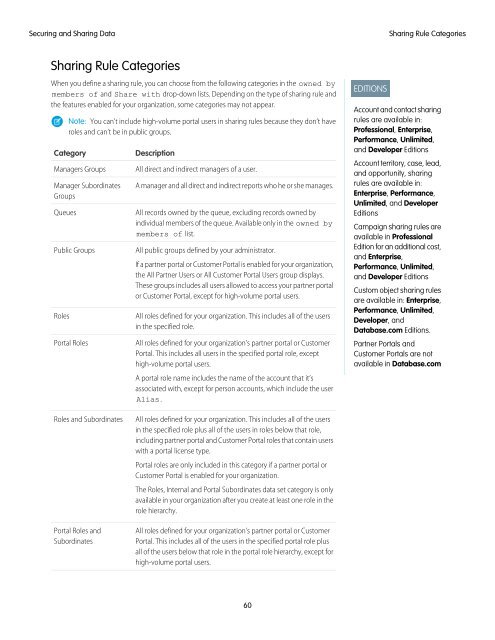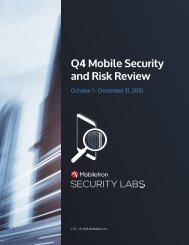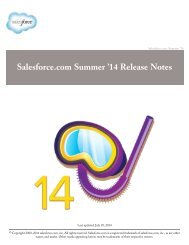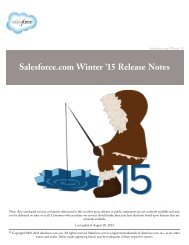salesforce_security_impl_guide
salesforce_security_impl_guide
salesforce_security_impl_guide
Create successful ePaper yourself
Turn your PDF publications into a flip-book with our unique Google optimized e-Paper software.
Securing and Sharing Data<br />
Sharing Rule Categories<br />
Sharing Rule Categories<br />
When you define a sharing rule, you can choose from the following categories in the owned by<br />
members of and Share with drop-down lists. Depending on the type of sharing rule and<br />
the features enabled for your organization, some categories may not appear.<br />
Note: You can’t include high-volume portal users in sharing rules because they don’t have<br />
roles and can’t be in public groups.<br />
Category<br />
Managers Groups<br />
Manager Subordinates<br />
Groups<br />
Queues<br />
Public Groups<br />
Roles<br />
Portal Roles<br />
Description<br />
All direct and indirect managers of a user.<br />
A manager and all direct and indirect reports who he or she manages.<br />
All records owned by the queue, excluding records owned by<br />
individual members of the queue. Available only in the owned by<br />
members of list.<br />
All public groups defined by your administrator.<br />
If a partner portal or Customer Portal is enabled for your organization,<br />
the All Partner Users or All Customer Portal Users group displays.<br />
These groups includes all users allowed to access your partner portal<br />
or Customer Portal, except for high-volume portal users.<br />
All roles defined for your organization. This includes all of the users<br />
in the specified role.<br />
All roles defined for your organization’s partner portal or Customer<br />
Portal. This includes all users in the specified portal role, except<br />
high-volume portal users.<br />
A portal role name includes the name of the account that it’s<br />
associated with, except for person accounts, which include the user<br />
Alias .<br />
EDITIONS<br />
Account and contact sharing<br />
rules are available in:<br />
Professional, Enterprise,<br />
Performance, Unlimited,<br />
and Developer Editions<br />
Account territory, case, lead,<br />
and opportunity, sharing<br />
rules are available in:<br />
Enterprise, Performance,<br />
Unlimited, and Developer<br />
Editions<br />
Campaign sharing rules are<br />
available in Professional<br />
Edition for an additional cost,<br />
and Enterprise,<br />
Performance, Unlimited,<br />
and Developer Editions<br />
Custom object sharing rules<br />
are available in: Enterprise,<br />
Performance, Unlimited,<br />
Developer, and<br />
Database.com Editions.<br />
Partner Portals and<br />
Customer Portals are not<br />
available in Database.com<br />
Roles and Subordinates<br />
Portal Roles and<br />
Subordinates<br />
All roles defined for your organization. This includes all of the users<br />
in the specified role plus all of the users in roles below that role,<br />
including partner portal and Customer Portal roles that contain users<br />
with a portal license type.<br />
Portal roles are only included in this category if a partner portal or<br />
Customer Portal is enabled for your organization.<br />
The Roles, Internal and Portal Subordinates data set category is only<br />
available in your organization after you create at least one role in the<br />
role hierarchy.<br />
All roles defined for your organization’s partner portal or Customer<br />
Portal. This includes all of the users in the specified portal role plus<br />
all of the users below that role in the portal role hierarchy, except for<br />
high-volume portal users.<br />
60






